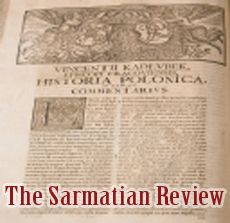| This Issue | Back Issues | Editorial Board | Contact Information |

From the Editor
April 2009
Volume XXIX, No. 2
From the Editor
Professor Domański’s article about thirteenth-century Polish historian Wincenty Kadłubek prompts two reflections. First, the term national character, so frowned upon in academia, has more gravitas than scholars are willing to admit. Propped by its literary and intellectual heritage, it handily condenses the self-image of a nation and the perceived continuity of its value system. In his delineation of virtues appropriate for a ruler, Kadłubek assigned priority to mercy and charity, as do the subsequent Polish historians starting with Jan Długosz in the fifteenth century. Was not Władysław Jagiełło’s mercy toward the Teutonic Knights (1410), or Jan Sobieski’s charity toward fellow Catholics in Vienna (1683) a manifestation of Kadłubek’s recommendation? The ranking of virtues performed over and over by Polish historians, writers, theologians, and public figures was both didactic and reflective of reality.
Readers will doubtless note a difference between the writing style of Professors Domański and McQuillen. The first is pre-Enlightenment: it searches for sources, similarities, and background while skimping on conclusions, and it does not try to hide the imperfect seams of a scholar’s labor. The second seeks innovation in the work discussed, and the possibility of a new interpretation. Professor McQuillen’s analysis of Stanisław Wyspiański’s monumental play offers a nontraditional interpretation; mutatis mutandis, it plays the same role regarding that play that the hero of Gombrowicz’s Ferdydurke played with regard to Polish Romanticism.
During the process of translation and editing of Adam Mickiewicz’s First Lecture at Collége de France, it was discovered that in the edition of Mickiewicz’s Lectures published in Soviet-occupied Poland in 1974 several slight but significant changes were introduced. The “People’s Poland” text was compared with one edited by Professor Manfred Kridl and published in the Second Polish Republic in 1929. The readers of Sarmatian Review are receiving the adjusted text. Professor BoÏena Shallcross, who translated the lecture, deserves our appreciation for making this text available in English for the first time.
A review by Japan’s leading Slavicist of a book by a leading Polish historian, Andrzej Nowak, demonstrates the necessity of making Polish scholarly works available to scholars worldwide, while at the same time presenting to American Slavicists (as well as to Americans of Polish background) the image of Poland as perceived by a disinterested observer from a geographical distance.
Finally, James Reid’s review of the movie Katyń speaks of the consequences of the German attack on Poland in 1939-forty-five years of Soviet occupation, and lies about history and society that became standard fare in scholarly books and at universities, as well as in daily social life. Was it Joseph Goebbels who said, “If you tell a lie big enough and keep repeating it, people will eventually come to believe it”? It is one of the ironies of history that this German master of lies proposed a rule in the lies game that was later applied by the Russian masters of lies.
The lie that Germans killed Poles at Katyń was typical of the masters of deceit who engineered the Soviet educational policy. The Russian military Internet sites still repeat that lie today.
Back to the April 2009 Issue
The Sarmatian Review
sarmatia@rice.edu
Last updated 5/1/09